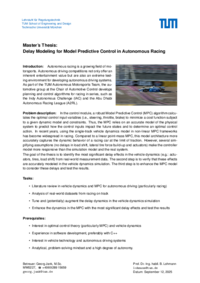Delay Modeling for Model Predictive Control in Autonomous Racing
- Institut
- Lehrstuhl für Regelungstechnik (TUM-ED)
- Typ
- Masterarbeit
- Inhalt
- experimentell theoretisch
- Beschreibung
Introduction
Autonomous racing is a growing field of motorsports. Autonomous driving competitions not only offer an inherent entertainment value but are also an extreme testing environment for developing autonomous driving systems. As part of the TUM Autonomous Motorsports Team, the automotive group at the Chair of Automotive Control develops planning and control algorithms for racing in series, such as the Indy Autonomous Challenge (IAC) and the Abu Dhabi Autonomous Racing League (A2RL).
Problem Description
In the control module, a robust Model Predictive Control (MPC) algorithm calculates the optimal control input variables (i.e., steering, throttle, brake) to minimize a cost function subject to a given dynamic model and constraints. Thus, the MPC relies on an accurate model of the physical system to predict how the control inputs impact the future states and to determine an optimal control action. In recent years, using the single-track vehicle dynamics model in non-linear MPC frameworks has become widespread in racing. Compared to a linear point-mass MPC, this model architecture more accurately captures the dynamic behavior of a racing car at the limit of traction. However, several simplifying assumptions (no delays in load shift, lateral tire force build-up and actuators) make the controller model more responsive than the simulation model and the real system.
The goal of the thesis is to identify the most significant delay effects in the vehicle dynamics (e.g.: actuators, tires, load shift) from real-world measurement data. The second step is to verify that these effects are accurately modeled in the vehicle dynamics simulation. The third step is to enhance the MPC model to consider these delays and test the results.
Tasks
- Literature review in vehicle dynamics and MPC for autonomous driving (particularly racing)
- Analysis of real-world datasets from racing on track
- Tune and (potentially) augment the delay dynamics in the vehicle dynamics simulation
- Enhance the dynamics in the MPC with the most significant delay effects and test the results
- Voraussetzungen
- Interest in optimal control theory (particularly MPC) and vehicle dynamics
- Experience in software development, preferably with C++
- Interest in vehicle technology and autonomous driving systems
- Analytical, problem-solving mindset and a high degree of autonomy.
- Betreuer:
- Georg Jank
- Lehrstuhl:
- Lehrstuhl für Regelungstechnik (rt Jank)
- Tags:
- Autonomous Racing, Model Predictive Control, MPC Delay Modeling, Vehicle Dynamics, Autonomous Driving Thesis, Racing Simulation, Delay Effects in Control Systems, Actuator Delay Modeling, Tire Force Dynamics, Load Shift Delay, Nonlinear MPC, Single-Track Vehicle Model, Real-World Racing Data, C++ Controller Development, Autonomous Vehicle Control, Control Systems Engineering, Autonomous Driving Research, AI in Motorsports, Simulation-Based Optimization, Autonomes Rennfahren, Modellprädiktive Regelung, MPC-Verzögerungsmodellierung, Fahrzeugdynamik, Abschlussarbeit autonomes Fahren, Rennsimulation, Verzögerungseffekte Regelung, Aktuatorverzögerung, Reifenkraftdynamik, Lastverlagerung Verzögerung, Nichtlinearer MPC, Einspurmodell Fahrzeug, Renndatenanalyse, C++ Reglerentwicklung, Reglerimplementierung, Fahrzeugregelung autonom, Regeleungstechnik, Forschung autonomes Fahren, KI im Motorsport, Simulationsbasierte Optimierung
- Möglicher Beginn
- sofort
- Kontakt
-
Georg Jank
Raum: MW0227
Tel.: +49 89 289 15659
georg.janktum.de - Ausschreibung
-
